In a pair of votes Monday afternoon and evening -- the last day of the legislative session -- New Jersey lawmakers gave final approval to a medical marijuana bill, which Gov. Jon Corzine (D) has said he will sign. The bill is one of the most restrictive yet, but it's one more state on the bandwagon.
The cops lined up against it -- literally! -- but that didn't stop the California Assembly's Public Safety Committee from voting to approve a marijuana legalization bill. And so, history is made this week in Sacramento.
Last weekend saw the single deadliest 24-hour-period ever in Mexico's drug war, with 69 people killed. And that's just for starters.
A sticky-fingering, meth-snorting cop goes away for awhile, and a trio of jail guards get in trouble.
It's been a wild week for weed in Washington. Hearings and initiatives and polls, oh, my!
With the Obama administration having removed the threat of federal prosecutions, the door is swinging open for an expansion of medical marijuana dispensaries. Activists in Oregon are walking through that door, and they are carrying a whole bunch of gathered signatures with them. Look for a dispensary initiative on the ballot there this fall.
San Francisco Supervisor Ross Mirkarimi wants the city's residents to vote on a measure that would make it city policy to license, tax, and regulate marijuana cultivation and sales, and not just medical. Now, he has to convince the rest of the Supes to agree with him -- or at least a majority.
A bill that would make New York the next medical marijuana state has won an Assembly committee vote.
Another legislative season begins across the land, and with it comes another crop of bills demanding drug testing of people receiving public benefits, from unemployment to food stamps to state medical assistance. They're expensive, they're impractical, and they're most likely unconstitutional, but that doesn't stop drug war demagogues from promoting them.
Acting from firmly prohibitionist principles, the Russian government saw potential new drug threats on the horizon and promptly criminalized them.

Sen. Scutari and Assem. Gusciora
New Jersey is set to become the 14th state to legalize the medicinal use of marijuana after the state Assembly Monday approved the "
Compassionate Use Medical Marijuana Act" by a vote of 46-14. Later Monday evening, the state Senate, which had already approved its version of the measure, voted final approval by a margin of 25-13. Outgoing Gov. Jon Corzine (D) has said he will sign the bill.
The Assembly debated the bill for half an hour Monday afternoon before approving it. The debate took place before galleries backed with bill supporters and opponents. It was a similar scene in the Senate a few hours later.
"It does not make sense for many of New Jersey's residents to suffer when there is a viable way to ease their pain," said Assemblyman Reed Gusciora (D-Mercer), one of the sponsors of the bill. "Medical marijuana can alleviate a lot of suffering, and there is no evidence that legalizing it for medical use increases overall drug use."
The bill will be one of the most restrictive in the nation. Patients diagnosed by their primary care physician as having a qualifying medical condition would be allowed to obtain -- but not grow -- medical marijuana through one of at least six "alternative treatment centers," or dispensaries. But patients would be able to register with only one dispensary at a time and would have to use the written recommendation within a month of when it was written.

Sen. Scutari and Mike Oliveri
Qualifying medical conditions include severe or chronic pain, severe nausea or vomiting or cachexia brought on by HIV/AIDS or cancer ("or the treatment thereof"), muscular dystrophy, inflammatory bowel diseases, and terminal illnesses where the patient has less than a year to live. Chronic pain was removed from the original bill in an Assembly committee vote last summer, but reinserted last week when the Assembly approved an amendment by Assemblyman Gusciora.
Patients could possess up to two ounces and be prescribed up to two ounces per month. That is an increase from the one ounce possession limit in earlier versions of the bill. Patients would be able to name a caregiver, courier, or delivery option to pick up medicine at the dispensary and deliver it to them.
"This will be the strictest medical marijuana law in the nation," Gusciora said at a statehouse press conference Monday. "We have a good bill that will be very strict and will not decriminalize marijuana, but will allow doctors to prescribe the best treatment for their patients."

patients share victory hug
Roseanne Scotti, director of the
Drug Policy Alliance New Jersey office, who has lobbied tirelessly for passage of a medical marijuana bill, agreed that the final Garden State bill is very tight, but said it was a start. "There will be some patients who will be able to get some relief," she said. "We think once the program's up and running and people see that there aren't problems, we'll be able to go back and get in some more of our patients."
Also at the press conference were patients Diane Riportella and Mike Oliveri. Riportella was diagnosed with Lou Gehrig's Disease in 2007 and given no more than five years to live. Oliveri suffers from muscular dystrophy.
"I'm so excited to be able to be alive and to be here for this moment," said Riportella, 53, of Egg Harbor Township. "Within a few seconds, I'm relaxed and I'm smiling and I go to Disneyland just for a few minutes and say 'It's not so bad, I can live another day,'" Riportella said.
Oliveri, 25, said he moved from his New Jersey home to California in order to be able to legally access medical marijuana. He said he vaporizes about an ounce a week to ease the pain in his legs and back and calm his digestive tract and that he had used it illegally before leaving for the West Coast. "I took every medication known to man before I took weed," said Oliveri, 25. "I knew it was a risk... but it was a life or death matter."

CMMNJ board members and friends in Assembly committee room, after Assembly vote and waiting for Senate vote (front row: Chris Goldstein, Peter Rosenfeld, John Wilson, Jim Miller; back row: Jim Bissell, Ken Wolski, Chuck Kwiatkowski)
The bill was supported by organizations including the New Jersey State Nurses Association, the New Jersey Academy of Family Physicians, the New Jersey Hospice and Palliative Care Organization, the New Jersey League for Nursing, the American Civil Liberties Union of New Jersey and the New Jersey chapters of the Leukemia and Lymphoma Society.
Special credit goes to the Coalition for Medical Marijuana-New Jersey, the patient and advocate group that has fought for years to get the bill over the top. The group's executive director, Ken Wolski, was pleased with the victory, but wasn't resting on his laurels. "We are grateful that the legislators finally acknowledged that marijuana is medicine and that patients in New Jersey who use it with a doctor's recommendation should not fear arrest and imprisonment," he said after the votes. "But this is really a national issue. New Jersey citizens should be able to travel anywhere in the country and use their medicine without fear of arrest. We are calling on the federal government to reschedule marijuana to a more appropriate schedule, and to protect New Jersey patients who need to travel outside the state."
New Jersey will now join Alaska, California, Colorado, Hawaii, Maine, Montana, Michigan, Nevada, New Mexico, Oregon, Rhode Island, Vermont, and Washington in the list of medical marijuana states. Barring any unexpected hitches, that list will also soon include the District of Columbia.
back to top
A bill to legalize the adult use, sale, and production of marijuana was approved Tuesday by a 4-3 vote in the California Assembly Public Safety Committee. While the vote was historic -- it marked the first time a state legislative committee anywhere had voted for a marijuana legalization bill -- a Friday legislative deadline means the bill is likely to die before it reaches the Assembly floor.
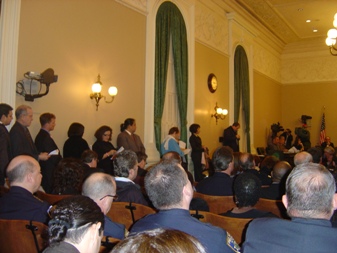
hearing room audience
Still, supporters pronounced themselves well pleased. "The conversation is definitely gaining traction in Sacramento," bill sponsor Assemblyman Tom Ammiano (D-SF) told a press conference at the capitol after the vote. "This is a significant vote because it legitimizes the quest for debate. There was a time when the m-word would never have been brought up in Sacramento."
"This historic vote marks the formal beginning of the end of marijuana prohibition in the United States," said Stephen Gutwillig, California state director of the Drug Policy Alliance, who testified before the committee both Tuesday and in an earlier hearing. "Making marijuana legal has now entered the public dialogue in a credible way. Decades of wasteful, punitive, racist marijuana policy have taken quite a toll in this country. The Public Safety Committee has demonstrated that serious people take ending marijuana prohibition seriously."
"The mere fact that there was a vote in the Assembly to regulate and control the sale and distribution of marijuana would have been unthinkable even one year ago," said former Orange County Judge Jim Gray, a member of Law Enforcement Against Prohibition, who also testified before the committee last fall. "And if the bill isn't fully enacted into law this year, it will be soon. Or, the bill will be irrelevant because the voters will have passed the measure to regulate and tax marijuana that will be on the ballot this November," Gray pointedly added.
The bill, AB 390, the Marijuana Control, Regulation, and Education Act, would impose a $50 an ounce tax on marijuana sales and would task the California Department of Alcoholic Beverage Control to regulate them. It was amended slightly from the original by Ammiano. In one example, the bill strikes "legalize" and replaces it with "regulate." It also strikes out language saying the bill would go into effect after federal law changes. And it adds language to clarify that medical marijuana does not come under its purview.
Tuesday's Public Safety Committee opened to a hearing room packed with legalization supporters, but also by more than a dozen uniformed police chiefs and high-ranking police officers from around the state. Law enforcement was out in force to make its displeasure known.

police and preacher in attendance to oppose the Ammiano bill
But first came Ammiano himself, recusing himself from his position as committee chair to testify in favor of his bill. "This is landmark legislation to legalize and regulate marijuana," Ammiano told his colleagues. "It would generate nearly a billion dollars annually in revenues, according to the Board of Equalization, and would leave law enforcement to focus on serious crimes, violent crimes, and hard drugs. The drug wars have failed," the San Francisco solon said emphatically. "Prohibition has fostered anarchy. Legalization allows regulations, and regulation allows order."
Since the primary hearing on the bill took place last fall, Tuesday's hearing was limited to 30 minutes, and witnesses either said their pieces succinctly or were gently chided by committee Vice-Chair Curt Hagman (R-Chino Hills). The Drug Policy Alliance's Gutwillig recapped testimony he gave last fall, as did the Marijuana Policy Project California state director Aaron Smith.
"AB 390 is a historic reversal of failed marijuana policies," said Gutwillig. "It would begin to control a substance that is already commonly available and consumed, but unregulated. Prohibition has created enormous social costs and jeopardized public safety instead of enhancing it."
"This legislation would finally put California on track for a sensible marijuana policy in line with the views of most California voters," said Smith.
Also endorsing the bill was Matt Gray of Taxpayers for Improving Public Safety, a California group lobbying for more progressive criminal justice policies. "We support the bill," said Gray. "Marijuana is the state's largest cash crop, and this bill will remove a revenue stream from organized crime and decrease availability for youth."
The opposition, led by law enforcement, church and community anti-drug groups, and a former deputy drug czar, threw everything short of the kitchen sink at the committee in a bid to sink the bill. Hoary old chestnuts reminiscent of "Reefer Madness" were revived, as well as new talking points designed to discourage members from voting for legalization.
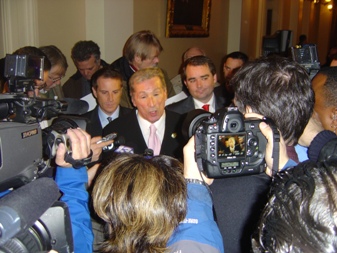
bill sponsor Assemblyman Tom Ammiano, with Dale Gieringer, Stephen Gutwillig and Aaron Smith in background
"I traveled here with a heavy heart," said former deputy director for demand reduction for the
Office of National Drug Control Policy Andrea Barthwell, the big hitter leading off for the opposition. "The eyes of America are upon you," she told the committee. "We don't want you to set a course that worsens the health of Americans for years to come. This is a scheme that will benefit drug cartel kingpins and corner drug dealers and create chaos in our public health system," she warned.
"People all over the country are afraid California will have this leverage in the same way the medical marijuana initiative was leveraged to create a sense that these are reasonable policies," Barthwell continued. "We've reduced drinking and smoking through public health, and prohibition is working for our young people to keep them drug free," she added.
"Legalization of marijuana will only increase the challenges facing us," said San Mateo Police Chief Susan Manheimer. "What good can come from making powerful addictive drugs more cheaply available? Don't we have enough trouble with the two legal drugs? Adding an additional intoxicant will lead to increase drugged driving and teen sex," she told the committee. "Marijuana of today is not the dope your parent's smoked," she added for good measure.
After mentioning that in the Netherlands cannabis cafes have "run rampant," asserting that "drug cartels will become legal cultivators," and that legalization would bring about "quantum increases" in the availability of marijuana, Manheimer swung for the fence. "To balance the budget on the back of the harm caused by illegal intoxicants is mind-boggling -- I would call it blood money," she said. Worse, "the addictive qualities of these drugs will cause more crimes as people struggle to find money to buy marijuana. We are very concerned about marijuana-related violence."
Then it was the turn of Claude Cook, regional director of the National Narcotics Officers Associations Coalition. "This is dangerous work we do," Cook said by way of introduction. "We are strongly opposed to AB 390, we see no benefit for our communities. Marijuana is also carcinogenic. If we want to raise revenue, maybe it would be safer to just bring back cigarette vending machines. This is human misery for tax dollars." And by the way, "Drug offenders who are in prison have earned their way there by past criminal conduct," he said.
Cook predicted downright disaster were the bill to pass. "Use by juveniles will increase. Organized crime will flourish. California will become a source nation for marijuana for the rest of the country. The cartels will thrive. Highway fatalities will rise," he said without explaining how he arrived at those dire conclusions.
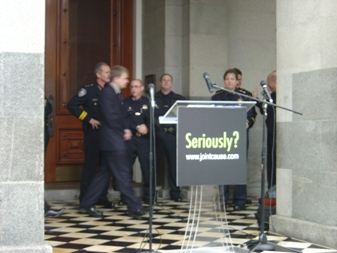
police waiting to speak at anti-drug rally after committee vote
"I see the devastation of marijuana and drugs in my community," thundered Bishop Ron Allen, "CEO and president" of the International Faith-based Coalition, and a self-described former crack addict who started with marijuana. "If marijuana is legalized and we have to deal with it in our liquor stores and communities, you have never seen a devastation like you're going to see. It's going to lose us a generation. You don't want this blood on your hands."
"I'm going to discount the ad hominems and alarmist attacks," Ammiano replied after the testimony. "Some of the arguments today reminded me of Reefer Madness," he said.
Before moving to a vote, committee members briefly discussed their positions. Assemblywoman Nancy Skinner (D-Berkeley) noted that because of the state's medical marijuana law, "We have created a class difference, where a certain class of our population can utilize dispensaries for their own reasons to use marijuana, and on the other hand, we have the street activity around marijuana that is not under semi-legal status."
Skinner voted for the bill, while saying she was not sure she would support it on the Assembly floor. "I'm not supporting marijuana, but the question is do we regulate it and is it time to have a serious debate."
In the end, four of five Democratic committee members -- all from the Bay area -- supported the bill, while one Democrat joined the two Republicans on the committee in opposing it.
The bill would normally head next to the Assembly Health Committee, but given the time constraints on the legislature, no further action is likely to be taken this session. Still, Tuesday was a historic day in Sacramento and in the annals of the American marijuana reform movement.
back to top
by Bernd Debusmann, Jr.
Mexican drug trafficking organizations make billions each year trafficking illegal drugs into the United States, profiting enormously from the prohibitionist drug policies of the US government. Since Mexican president Felipe Calderon took office in December 2006 and called the armed forces into the fight against the so-called cartels, prohibition-related violence has killed over 16,000 people, with a death toll of over 7,000 so far in 2009. The increasing militarization of the drug war and the arrest of several high-profile drug traffickers have failed to stem the flow of drugs -- or the violence -- whatsoever. The Merida initiative, which provides $1.4 billion over three years for the US to assist the Mexican government with training, equipment and intelligence, has so far failed to make a difference. Here are a few of the latest developments in Mexico's drug war:
Friday, January 8
A particularly gruesome killing occurred in Los Mochis, Sinaloa. The body of 36-year old Hugo Hernandez was found in seven pieces and left with a note threatening members of the Juarez Cartel. Hernandez's face had been skinned off his body and stitched onto a soccer ball and left in a plastic bag near city hall. His torso was found in another location, and his arms, legs, and skull were found in a box at a third location. Hernandez had apparently been kidnapped January 2nd in the neighboring state of Sonora, in an area known for cannabis cultivation.
In the city of Saltillo, Coahuila, the body of a local journalist was found tortured and shot five times from close range. Valentin Valdes, 29, was a reporter for a local newspaper. He was executed outside a motel where 10 reputed Gulf Cartel members had been arrested in the last week. Valdes has been kidnapped Thursday in downtown Saltillo along with another journalist, who was released after being beaten. A note was left with the body that read "This is going to happen to those who don't understand that the message is for everyone." At least 12 journalists were killed in Mexico in 2009, and two others are missing and presumed dead.
Sunday, January 10
In the the biggest single-day death toll in Mexico's drug war so far, 69 people were killed in a 24-hour period. The previous record was 57 killed in a 24-hour period on August 17, 2009. Twenty-six of the killings occurred in Ciudad Juarez, which reported a total of 2,635 murders in 2009. Among the dead in Ciudad Juarez were two bodies found decapitated, one of which had his eyes gouged out. Eight people were killed in other parts of Chihuahua, seven in Sinaloa, one in San Luis Potosi, five in Durango, five in Guerrero, six in the state of Mexico, seven in Mexico City, two in Guanajuato, three in Tijuana, and one in Tierra Caliente.
Sunday, January 10
In Sinaloa, the bodies of four members of a family were found by the side of a highway. The three men and one woman had been kidnapped from their home in Culiacan last Thursday. The bodies were found with their hands and feet bound and suffered multiple gunshot wounds. A note which called the killings "a black gift" was found with the bodies. Two other bodies were found in other parts of Sinaloa.
In Sonora, six people were murdered, four of them in Nogales, just across the US border. In Tijuana, a gun battle between rival criminal bands left one man dead and two wounded. In Mexico City, a young man was shot by his brother as they rode in a Mercedes-Benz.
Tuesday, January 12
In a major coup for the government, Mexican forces arrested one of Mexico's most important drug cartel bosses. Teodoro Garcia Simental, 36, is the leader of a breakaway faction of the Tijuana Cartel which has allied itself with the Sinaloa Cartel. Authorities believe he is linked to some 300 murders, many of which involved beheadings or bodies being hung from bridges or dissolved in acid. He is also thought to be responsible for dozens of assassinations of Tijuana law enforcement personnel. He was arrested in a raid at a luxury beachfront condo in La Paz, Baja California.
The Ciudad Juarez killings of two teenagers has brought the 2010 total of homicides in the city to over 100. Fifteen homicides occurred on Monday.
During the same time period, eight homicides occurred in the city of Chihuahua, the capital of the state of Chihuahua of which Ciudad Juarez is part. Among the dead was a policeman who was killed in a gun battle which occurred after he and several colleagues were ambushed by suspected cartel gunmen. In Sinaloa, the body of a missing policeman was found dead.
Wednesday , January 13
In a change in strategy, the Mexican army will stop patrolling the streets of Ciudad Juarez. The army will continue, however, to participate in what the government calls "preventive" raids in coordination with the police. The new strategy calls for the introduction of 1,600 federal police officers to replace the military presence on the streets of the city. In addition, the government's new strategy calls for an increase in the use of technology, such as unmanned aerial vehicles (UAV's) and surveillance balloons.
Overnight, the son of a radio-station owner was gunned down in Chihuahua after being ambushed at an intersection. At least one other person was killed and three wounded in drug-related violence in Chihuahua. At least seven people were killed in Ciudad Juarez. Among the dead was a teenage boy found bound and showing signs of torture.
In Tamaulipas, authorities confiscated 665 packages of marijuana, which totaled more than 7 tons. Three men were taken into custody after the seizure, which took place after police searched a house in the city of Reynosa.
Total Body Count for the Week: 202
Total Body Count for 2010: 339
Total 2009 Body Count: 7,724
Read the last Mexico Drug War Update here.
back to top
A sticky-fingering, meth-snorting cop goes away for awhile, and a trio of jail guards get in trouble. Let's get to it:

seized cash
In Glendora, California,
a former Glendora police officer was sentenced Tuesday to six months in jail, three years of probation, and a 24-month drug rehabilitation program after pleading no contest to grand theft and methamphetamine possession charges. Timothy Radogna, 34, was arrested in May in an "integrity sting" after superiors received reports he was failing to book drugs and cash into evidence. Police left meth and $1,000 in cash in a bait car, and Radogna took the bait. He could have gotten up to nine years.
In Beaumont, Texas, a former Texas Department of Corrections guard pleaded guilty Monday to trying to smuggle drugs and a cell phone into the Stiles Unit in his lunchbox. Eric Talmore, 25, copped pleas to bribery and having a prohibited substance in a correctional facility. He got busted with tobacco in his socks, rolling papers in his underwear, and marijuana and a cell phone hidden inside a container of fried rice. He faces up to 30 years in prison when sentenced on February 16, but his attorney is asking for probation.
In Manchester, Kentucky, a Clay County Detention Center guard was arrested Sunday on charges she smuggled drugs to inmates in the jail. Guard Dawn Hayes, 31, fell prey to an undercover investigation by the County Sheriff's Office, taking drugs to be smuggled into the jail from a confidential informant. Hayes is currently residing at her place of employment.
In Chesterton, Indiana, an Indiana State Prison guard was arrested January 2 for trying to smuggle tobacco and marijuana into the prison. Barb Roseborough, a nine-year veteran, got caught when prison staff found a package wrapped in electrical tape hidden in the lining of her bag as she reported for work. A second package was later found hidden on her person. She has been charged with trafficking with an offender and felony marijuana possession. She faces from two to eight years on the first count and up to three years on the second. At last report, she was being held at the LaPorte County Jail.
back to top
It's been a busy week for marijuana in Washington state. Activists announced the filing of a legalization initiative Monday, the House held hearings on a pair of marijuana decriminalization and legalization bills Wednesday, and a statewide poll released Tuesday showed majority support for legalization.
At the statehouse, the House Public Safety and Emergency Preparedness Committee was the scene of the hearings on a pair of bills, HB 1177 and HB 2401. The former would decriminalize marijuana possession; the latter would legalize marijuana possession, cultivation and sales, and regulate it like alcohol.
Proponents argued that marijuana prohibition has been as ineffective as alcohol Prohibition. "We have not deterred the use of marijuana, nor have we seen a noticeable impact on the availability of marijuana," legalization bill sponsor Rep. Mary Lou Dickerson (D-Seattle) told the committee. "Over the last decade, we have wasted scores of taxpayer dollars on investigation, court proceedings and incarceration."
Under Dickerson's bill, marijuana would be sold in Washington's 160 state-run liquor stores and would be taxed at 15% of the retail price. Funds raised by taxing marijuana would be mainly earmarked for drug abuse prevention and treatment. Dickerson said her measure could raise up to $300 million a year for the state.
The decriminalization bill, sponsored by Rep. Dave Upthegrove (D-Des Moines), would make adult possession of marijuana a civil infraction with a $100 penalty. Under current state law, it is a misdemeanor punishable by a mandatory minimum one-day sentence and up to 90 days in jail.
"It's not about fighting for our right to party," said Upthegrove. "My interest is to minimize drug addiction."
Of course, the police were not happy. "If you believe that it is okay for kids in school to use marijuana and be high, then you should pass either one or both of these," said Don Pierce, executive director of the Washington Association of Sheriffs and Police Chiefs.
"I for one would prefer not to have another substance that's going to allow an impaired individual, in a legal fashion, during the hunting season, for example, using a fire arm" or operating a boat or driving, said John Didion, president of the Washington Association of Sheriffs and Police Chiefs.
But a former Republican state senator, Bill Finkbeiner, testified that it was time to consider changing the marijuana laws. "There's a very real cost to having our police, our courts and our jails have to deal with a problem that's a victimless crime," Finkbeiner said. "Public opinion is evolving on this issue."
A poll released this week suggested Finkbeiner was onto something. The KING5-TV/SurveyUSA poll of 500 Washingtonians reported that 56% thought legalization was a good idea and 54% approved the idea of selling marijuana through state-run liquor stores.
The committee also heard from Ric Smith of Sensible Washington, the group that filed the initiative Monday. He told the solons not to worry about legalizing marijuana -- the voters would take care of it in November. "We're going to take it out of your hands," he said. "Just wait for our initiative. It will take care of everything."
The initiative, sponsored by attorneys Douglass Hiatt and Jeffrey Steinborn, as well as Smith, Hempfest head Vivian McPeak and Philip Waine Dawdy, would remove all state criminal penalties for adults who possess, cultivate, and sell marijuana -- no matter the quantity. Supporters must gather 241,000 valid signatures by July 2 to qualify it for the November ballot.
Meanwhile, the House committee will vote on the decrim and legalization bills next week.
back to top
If early signature-gathering results are any indication, Oregon residents will be voting in November on an initiative that would authorize the establishment of a medical marijuana dispensary system. At a Monday press conference, initiative organizers announced that they had handed in 61,000 signatures. A total of 82,000 valid signatures are necessarily to place the measure on the ballot, and organizers have until July to come up with the remaining signatures.
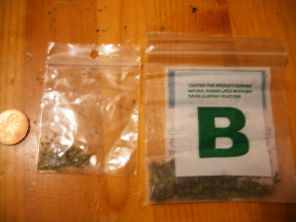
California medical marijuana bags (courtesy Daniel Argo via Wikimedia)
The initiative,
I-28, is sponsored by
Voter Power, the same organization responsible for getting the Oregon Medical Marijuana Act (OMMA) on the ballot in 1998. OMMA did not provide for dispensaries, leaving patients to either grow their own medicine or seek out someone to grow it for them.
Voter Power's initiative would create a system of state-regulated nonprofit dispensaries. The system would require no state government expenditures, relying instead on licensing fees to pay for itself. Dispensaries would distribute medical marijuana to qualified patients and would be allowed to recoup expenses and production costs. Individuals could also be licensed as growers to supply patients and dispensaries.
Five of the 13 states that have legalized medical marijuana have provisions for dispensaries. They range from the relatively loosely regulated system in California to the tightly controlled system in Rhode Island. The threat of federal prosecution acted as a retardant to dispensary expansion to medical marijuana states that do not have them, but since the Obama administration's policy shift away from prosecuting medical marijuana providers acting in compliance with state laws, that disincentive has largely vanished.
Oregon has more than 26,000 people registered as patients under the OMMA, with another 5,000 applications in the pipeline. It also has an estimated 15,000 medical marijuana grow operations.
back to top
If San Francisco City Supervisor Ross Mirkarimi has his way, voters there will go to the polls in June to decide whether the city should tax and regulate marijuana growing and distribution. On Tuesday, Mirkarimi proposed a ballot measure that would make it official city policy to "license, regulate, and tax the cultivation and sale of cannabis."

Ross Mirkarimi
"It's time that we have a regulating system in place," said Mirkarimi, who said regulations could address issues such as where grows could take place, how much could be grown, and what safety precautions are needed.
Mirkarimi said the city could not tax marijuana sales without authorization by the state. A bill by fellow San Franciscan Assemblyman Tom Ammiano passed an Assembly committee this week, but is effectively dead for the session after failing to get a hearing before another committee, but an initiative that would tax and regulate marijuana sales by local option is likely to be on the ballot in November.
Mirkarimi must still won the support of a majority of the Board of Supervisors to get the issue on the ballot.
back to top
The New York State Assembly's Committee on Health Thursday approved a bill that would legalize the use of marijuana for patients suffering from life-threatening medical conditions. The bill now heads to the Assembly's Public Codes Committee.
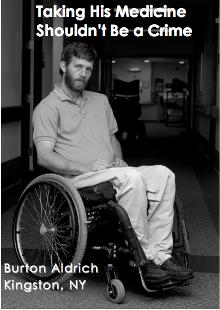
NY medical marijuana campaign poster
The bill,
A 7542, is sponsored by Assemblyman Richard Gottfried, chair of the Health Committee. It would legalize the possession of up to 12 plants and two and a half ounces of marijuana by certified patients or their caregivers. The bill would direct the Department of Health to promulgate rules and regulations for registry ID cards. It would provide for "registered organizations," including hospitals, pharmacies, and nonprofit groups to grow, deliver, and sell medical marijuana to certified patients.
The bill does not list allowable diseases or conditions. Instead, it allows practitioners to recommend marijuana for "serious conditions," which it defines as "a severe debilitating or life-threatening condition or a condition associated with or a complication of such a condition, or its treatment."
"If a patient and their physician are in agreement that the most effective way of controlling their symptoms is marijuana, government should not stand in the way of treatment," said Gottfried. "It is cruel to turn end-stage patients into criminals when they are following what their doctors recommend for relief."
The first medical marijuana bill was introduced in New York in 1997.
Thirteen states currently allow for the medicinal use of marijuana. New Jersey should become the 14th state within the next week, and the District of Columbia will follow shortly after that. In New Jersey, a passed bill awaits the governor's signature, and in the District, Congress last month removed the ban on implementing the city's 1998 vote in favor of medical marijuana, but still has about three weeks of working days to reconsider.
back to top
A perennial favorite of drug warriors, bills that would require people receiving public benefits to submit to mandatory drug tests are being introduced in statehouses around the country again this year. In South Carolina, the focus is on people receiving unemployment benefits; in Kentucky, the focus is on people receiving any public assistance, including food stamps and state medical care. Meanwhile, in West Virginia, the author of last year's failed mandatory drug test bill for welfare recipients is back with a new, improved version. And in Florida, a similar drug testing bill is in the works.
Drug testing recipients of public assistance has a certain superficial appeal, especially to politicians willing to pander to culturally and fiscally conservative constituencies. But that appeal is usually found wanting in the face of questions about cost, practicality, and, most crucially, legality. Michigan is the only state to actually pass a law requiring mandatory drug testing to receive benefits, but that law was declared unconstitutional by a federal appeals court that held it violated the Fourth Amendment's protections against unreasonable searches.
That did not stop legislators in at least six states from introducing bills last year, and at least four states have seen bills filed or pre-filed so far this year.
In South Carolina, Sen. David Thomas (R-Greenville) has introduced S 920, which could cut off unemployment benefits for people who test positive for illegal drugs. Under the bill, anyone currently receiving benefits must submit to a drug test. If the test is positive, the benefits are cut off until the applicant completes drug treatment. The applicant must agree to random drug testing, and if he fails a random drug test, he must undergo a second round of treatment. He also loses benefits for a year.
"My concern is as much for those who are addicted or misusing drugs as for the folks that are paying the bills," Thomas told the Associated Press. "Ultimately, I think the question needs to be asked, 'Should unemployment be provided for people with ongoing drug problems, because they're using that unemployment money to feed the habit?'"
About 150,000 South Carolinians are currently receiving unemployment benefits. Testing each of them could run into the millions of dollars, and providing treatment for some percentage of them could prove costly as well.
Thomas' bill has been referred to the Senate Judiciary Committee. No hearings have been scheduled.
In Kentucky, the bill introduced by Rep. Lonnie Napier (R-Lancaster), HB 120, is even more ambitious that the South Carolina bill. It would require anyone seeking public assistance via cash, food stamps or the state medical assistance program to be drug tested. Nearly 740,000 Kentuckians receive food stamps and 748,000 receive medical assistance.
Under Napier's bill, all recipients would face an initial drug test and a random drug test at some point over the next year and every year they are receiving assistance. Those who test positive for a Schedule I controlled substance or a prescription drug not prescribed to them would be ineligible for benefits. The bill contains no provision for drug treatment, nor any provisions financing a million or more drug tests.
In West Virginia, Delegate Craig Blair (R-Berkeley), whose controversial bill to drug test welfare recipients was killed last year, is touting a new version of the bill, and this time, he has the backing of the House Republican caucus, which made the bill part of its 15-point legislative agenda this week. The new bill has some new twists: it calls for random drug testing of West Virginia elected officials, it would make drug testing of welfare recipients random instead of mandatory, and it would only apply to new welfare applicants. Under the new bill, randomly selected applicants who test positive could receive welfare benefits for two months, but after that, they would have to test clean or be in a drug treatment program or risk losing their benefits.
We will be watching these and any similar bills filed at statehouses around the country. Stay tuned!
back to top
The Russian government announced Thursday that it has added a number of substances to its controlled substance list and banned their sale. The substances include salvia divinorum, Hawaiian wood rose, Blue Lotus flowers, and 23 different synthetic cannabinoids. Many of the substances are used in "smoking mixes" by users seeking psychoactive effects.

salvia leaves (photo courtesy Erowid.org)
The ban had its genesis in a proposal by the Ministry of Public Health and Social Development last month. The ministry proposed tightening controls over the sale and consumption of smoking mixes and submitted its proposal to the government for coordination.
Salvia is already banned in a number of countries, including Australia, Belgium, Denmark, Estonia, Finland, Italy, Japan, Spain, and Sweden. It is not illegal under US federal law, but its sales have been banned or restricted in about a dozen states. Synthetic cannabindoids, marketed under names like "K2" and "Spice" have been banned in Austria, Germany, the Netherlands, and Switzerland. A move is afoot in the Kansas legislature to ban them there.
back to top












